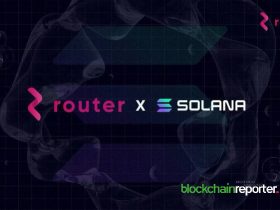Morocco has decided to follow fellow African countries in exploring emerging technologies to revitalize its digital economy, investing over $1 billion in artificial intelligence (AI) and blockchain, while on the other side of the world, two of the world’s largest food companies have partnered to trial blockchain technology to trace soybeans from South America to Asia.
Moroccan Prime Minister Aziz Akhannouch recently unveiled the Digital Morocco 2030 strategy, which seeks to turbocharge the country’s digitalization efforts, create employment and make Morocco Africa’s leading tech hub.
The roadmap aims to boost the country’s digital infrastructure and create 240,000 jobs in Africa’s sixth-largest economy. This is expected to push the country’s digital export revenues to $4.2 billion by 2030, with its overall contribution to the Moroccan economy expected to hit $10.4 billion.
Morocco is home to around 1,500 startups according to one study, with their total revenues estimated at $200 million. This number is expected to double by the decade’s end, with the roadmap pledging tax incentives for entrepreneurs.
“Through this strategy, which mobilizes 1.1 billion dirhams between 2024 and 2026, the executive aims to train 100,000 young people annually in the digital field (up from 14,000 in 2022) and sets the goal of employing 240,000 people in the national digital sector,” commented Akhannouch.
Education is critical for Morocco to improve its human capital in the digital spaces, stated the Prime Minister, calling on local universities to triple the number of graduates in digital disciplines by 2027.
Blockchain is one of the technologies the country intends to heavily invest in. While this will involve regulations allowing private entities to build blockchain applications, the government intends to take the initiative and integrate the technology into public services.
One of the key applications will be in the country’s Unified Administrative Services Portal, which combines critical government services across the education, health and social services sectors. Blockchain is expected to boost security and efficiency, with AI to be used in data analysis and to assist in decision-making and automation.
Morocco’s digital aspirations should know no borders, stated Chakib Alj, the head of CGEM, the country’s official private sector association, at the launch of the roadmap. Alj called on Moroccan entrepreneurs in the digital space to target the entire continent with their solutions—Morocco’s population stands at 37 million, the smallest in the top seven African economies.
Morocco has been pushing for the adoption of emerging technologies in recent years as it pivots away from overreliance on tourism, which is one of the main employers. This year, the country’s courts started using AI to transcribe rulings, conduct research and retrieve archived materials.
Blockchain for traceability
Bunge Global SA (NASDAQ: BG), a Missouri-based food processor specializing in soybeans, announced the partnership with Bangkok Produce Merchandising Public Co., a subsidiary of Thailand’s CP Foods, the world’s third-largest pork producer.
The two have transported 365,000 metric tons of soybean meals that are provably deforestation-free from Brazil to Thailand, with half the shipments done in July as they scaled up the pilot project. While CP Foods mainly used blockchain to trace the soybeans and ensure they had been grown ethically and sustainably, it also gave consumers access to data such as the carbon footprint and whether the source farm had integrated regenerative agricultural practices.
The trial is geared toward capitalizing on the rise of consumer concern over sustainability in the food chain. A study by Euromonitor found that two in three consumers are worried about climate change and are willing to pay more for their food to promote sustainability. Another study by the Boston Consulting Group found that for 77% of consumers, sustainability in food purchases is among the key considerations when shopping.
This trend makes traceability along the entire food supply chain vital for food producers and retailers. Blockchain has emerged as the ideal solution for this sector. Its transparent and immutable ledger guarantees all stakeholders that data hasn’t been altered, promoting trust.
The BSV blockchain, the only enterprise-ready network, has taken the lead. Solutions like UNISOT are transforming multiple sub-sectors in the food supply chain on BSV. Its most recent product, HalalOnChain, enables companies targeting the Muslim community to prove their products adhere to Islamic law.
For Bunge, blockchain is the ideal tool to build on the end-to-end traceability it has been striving to offer for years, commented Rossano de Angelis Jr., the company’s VP for agribusiness in South America. He believes that blockchain will significantly increase “end-consumer confidence” in its products.
For now, the main focus for Bunge is proving that its soybeans in Brazil have been cultivated on deforestation-free land. In Brazil, deforestation has been a massive challenge; studies show that 20% of the 670 million hectares of Amazon forest has been lost to deforestation and that a further 20% could be lost by 2030 unless measures are taken to curb the vice.
While the government is responsible for stopping deforestation, food producers and consumers can play a part by avoiding produce from deforested areas. With blockchain, producers can prove that their food has been ethically cultivated, and Bunge and CP Foods are championing the course.
Bunge may be in the early stages of integrating blockchain into its operations, but we can anticipate the success of its latest partnership based on UNISOT’s previous demonstration using the emerging technology. UNISOT, a Web3 supply chain sustainability platform, is one of the companies that spearhead blockchain integration in the supply chain sector, showcasing the immense potential of the technology in transforming the seafood market with its SeafoodChain initiative.
Built on UNISOT’s Asset Traceability Platform, SeafoodChain is a blockchain solution integrated with artificial intelligence (AI) technology. This innovative system offers a comprehensive and transparent approach to aid companies in adopting sustainable practices while ensuring adherence to prevailing regulations.
In order for artificial intelligence (AI) to work right within the law and thrive in the face of growing challenges, it needs to integrate an enterprise blockchain system that ensures data input quality and ownership—allowing it to keep data safe while also guaranteeing the immutability of data. Check out CoinGeek’s coverage on this emerging tech to learn more why Enterprise blockchain will be the backbone of AI.
Watch: ExamSolutions re-invents education with AI
title=”YouTube video player” frameborder=”0″ allow=”accelerometer; autoplay; clipboard-write; encrypted-media; gyroscope; picture-in-picture; web-share” referrerpolicy=”strict-origin-when-cross-origin” allowfullscreen=””>







Leave a Reply